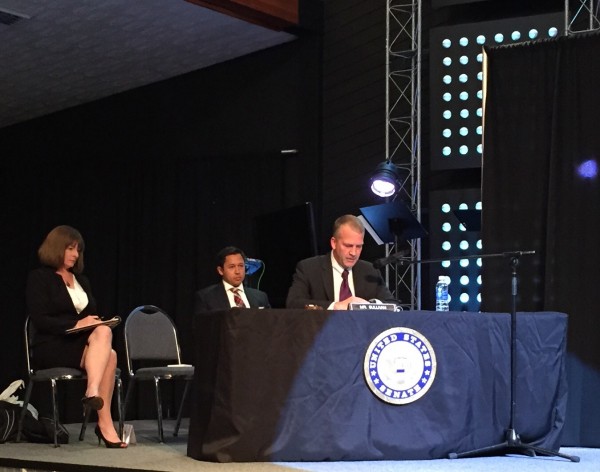Sen. Dan Sullivan held a field hearing in Eagle River on Tuesday focused on health care for veterans in Alaska. It was an effort, he told the modest crowd, to bring a bit of D.C. to Alaska.
Officials, politicians, and veterans themselves agree on what is causing massive problems accessing healthcare recently. Now, they are pivoting towards a search for solutions.
The Veterans Administration has been in the news a lot the last few weeks. That’s for two big reasons: first, the August recess is a time for congressional leaders and cabinet members to visit the communities they craft policy on behalf of.

Secondly, since passage of the Choice Act a year ago, there have been some hiccups, to put in mildly.
“Nothing less than an unmitigated failure for our veterans,” was how Sullivan framed the implementation of the Choice Act in Alaska during his opening remarks, attributing it to the “one-size-fits-all design” of the program.
Sullivan sits on both the Senate’s Veterans Affairs Committee , and has been upset by calls from constituents over severe disruptions that happened after the national VA ran out of money earlier this year.
Nationwide, the Choice Program actually worked too well: the number of medical appointments skyrocketed. But, then, so did the costs for that care. The result in Alaska has been canceled operations, enormous medical bills, and just a lot confusion.
There have been several listening sessions across the state this month, but a field hearing is different: this was the Veterans Affairs Committee officially convening for testimony.
“We don’t need rhetoric,” Sullivan said, “what we need are answers.”
The consensus among everyone who spoke was that the VA was doing great in Alaska until the funding cuts exposed holes in the the rapidly enacted Choice Program.
“(It) wasn’t ready for prime-time,” said Verdie Bowen, director of the State’s Department of Military and Veterans Affairs, which overnight went from having some of shortest wait-times in the country to a confusing mess as a result of protocols established under Choice.
“We had several veterans that were scheduled for colonoscopies, went through the prep, went to to the hospital, only to discover that the appointment had been canceled,” Bowen said, “because there was no funding for the appointment.”
In the whole debacle, a lot of fingers have been pointed at TriWest, the intermediary company that, under the Choice Act, has a contract handling referrals and appointments, which have slowed to a halt, particularly in southcentral Alaska.
TriWest president David McIntyre explained they are scrambling to keep up with an unanticipated explosion in demand from the hastily drafted legislation.
“What got implemented was also in the hands of Congress, and at the time the VA,” McIntyre said. “We all were given 30 days to implement a new law, to go from blank sheet of paper to full execution.”
McIntyre told Sullivan the company has already quadrupled its staff from 400 to 1,600, and is in the process of training another 900 employees to try meeting demand. They’re also making sure that local calls for care are routed through Washington state, so personnel are more familiar with Alaska’s unique access issues.
The role of the Congress was also brought up by Under Secretary for Health David Shulkin, third-in-command at the VA. Shulkin is new to the job: in fact, the hearing in Alaska marked his 49th day on the job. He’s also new to the VA: his background is with large private research hospitals, and he expects finding internal fixes and efficiencies to improve the VA system.
Still, similar to other leaders from the VA he believes the nation is dealing with a structural problem as it tries to get an ever-growing and aging population of veterans connected with care.
“We have to do a better job at VA of defining what our needs are, and letting Congress know what we need to be able to take care of the veterans of this country who have served out country,” Shulkin said at a small press conference ahead of the field hearing. “But it may be that with better projections that we actually do need more resources.”
Shulkin says the VA is preparing a proposal for November 1st that could re-establish the Alaska VA as the primary scheduler for appointments, grant more flexibility in choosing local care options, and consolidate funds for payment. Measures, Shulkin, that don’t stand a chance without support in Congress.
Correction: An earlier version of this story stated the field hearing was part of the Senate’s Armed Service’s Committee. While Sen. Sullivan does serve on the Armed Services Committee, the event fell under the Veterans Affairs Committee.
Zachariah Hughes reports on city & state politics, arts & culture, drugs, and military affairs in Anchorage and South Central Alaska.
@ZachHughesAK About Zachariah




